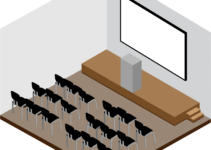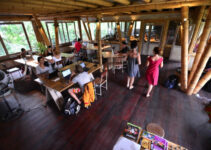“I always go back to what your values and needs are in an office space, specifically co-working spaces. With so many options available, it can be overwhelming to choose the right one, especially if you work from home or remotely. In this video, we spoke to three different co-working operators – small, midsize, and large – to help you choose the right co-working space for yourself. If you’re just starting out, you’ve probably heard of co-working spaces, but what exactly are they?”
Coworking spaces are complex shared offices where people go to work with each other.
The way it works is that you typically buy a membership and get access to space. Sometimes it is a desk, other times it is offices, and based on how much you need it for and the length of time, you perhaps pay a membership fee. Now, coworking spaces can be found in almost every major metropolitan city. When it comes to that, what you have to figure out is based on your local community, what is the best and right coworking space for you. If you’re curious about who actually uses coworking spaces, it’s really a wide spectrum.
You have everyone from a solopreneur or a freelancer or someone who just works by themselves on their business, perhaps it’s a lawyer or accountant, all the way from startups with a few employees all the way to enterprises. Now, you’ve probably heard of some of the big names such as WeWork and others. When it comes to those, what you’ll realize is there is a spectrum, and based on that, you might have different needs. For a start-up or a solopreneur, they might just need a desk, whereas if you’re an employee or perhaps you are a team of 50 or 30, you might need a dedicated office or a space where you can all communicate with each other. When it comes to coworking memberships, you have three options.
One is what’s typically called a hot desk or a shared desk. Now, what you have right behind me is something like it. You pay a membership fee and get access to any available desk space. That is a typical hot desk. When you have a dedicated desk, that typically means you have a dedicated desk just for yourself, so you can come in, leave your stuff if you want to, and you have that dedicated space available.
On the more private end, you have an office. An office could be one individual person or two people, or you can have much bigger offices. That’s dependent on your needs. In this video, we’re going to talk to three coworking operators to help you understand how to go about choosing a coworking space, whether you’re a startup or you’re an enterprise with several employees. This will help you decide on how to choose the best and right coworking space based on your needs.
Hey, everyone, I’m here with Neil Martin, the co-founder of Project Spaces, our space that we’re in. Hey, Neil. Hey, I’m good. So obviously, we’re here in Project Spaces. What exactly is Project Spaces?
Project Spaces is a growing network of shared office spaces or coworking spaces for entrepreneurs, freelancers, remote workers, digital nomads of all kinds. We’re here in our Cameron Street location right now, which we opened in 2014. Our first location is over King and Bathurst, which opened in 2011 over in King West. Wonderful. And what makes Project Spaces different than other coworking spaces?
I think it can’t be that we like to talk about the vibe here. We’re very community-focused. Most of our companies here are one or two-person teams, so visiting people who could be working at home or by themselves can be boring and lonely. Therefore, they are looking for a place to have some routine and interact with people. We really like to focus on the people.
Hey, my name is Zachary Habayeb, and I am the community development lead at Watershed Partners. We are a collective of co-working spaces in the city of Toronto and the city of Victoria in British Columbia. Our co-working space is unique because we like to curate our community a little bit more than you would find at, let’s say, WeWork or other spaces. It’s all about creating the right environment, not only with the people but also in the actual physical environment. So, what does the space make you feel?
How does it evoke an emotion? That’s why we have plants everywhere, and we like warm colors like wood and natural earth tones like blues and greens, just to make a more productive, calming environment.
What makes Watershed different from other co-working spaces in the city of Toronto is that we are a multi-faceted organization. We have an organization called the Watershed, which is our co-working offering where we curate community specifically focused around Canadian technology and Canadian startups. We have companies from Montreal, Vancouver, Victoria, Toronto, and Ottawa here in the space.
But we also have another business home called Watership Partners, which is a collaborative design management consulting firm that helps essentially support the Watershed and build local communities in each market that we operate in, like Victoria, BC, Ottawa, and Toronto.
Hey, everyone, I’m here with Sarah, and Sarah, could you just share a bit more about yourself and IQ? Absolutely. So, my name is Sarah Lieberman, and I’m the vice president of sales at IQ offices. I’ve been with the company for five years.
We were founded in 2012, so I got in a couple of years in. We started with one location in Toronto, and today we are 11 locations. These locations are all around the world, and we calculate that by square footage. We are in Toronto, Vancouver, Calgary, Ottawa, and Montreal, about to add one more.
So, obviously, you have a realm of experience operating in different cities.
What makes your co-working space different?
Absolutely. We really have three differentiators that we like to focus on. The first is our space. We like to build beautiful spaces, as you can see here, and we always look at the best buildings and the best markets and the cities that we serve.
The second one has to do with our level of service. We make sure to stock each of our locations so that our members on-site can focus on their core business, and we focus on everything having to do with managing the workspace around the world. The third one has to do with privacy and security. We really put a focus on building productive workspaces for our members where they can hire, attract, or engage and retain the best talent in the city.
Now, who’s a



